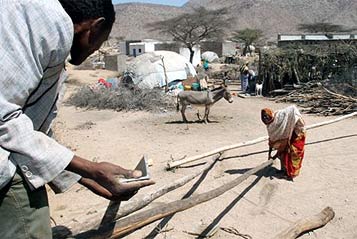Transplanting tukuls in the Somali desert
Transplanting tukuls in the Somali desert

HARRIRAD, North-west Somalia, March 31 (UNHCR) - The former exiles of Harrirad don't waste any time. Just minutes after climbing down from the UNHCR trucks that brought them home from 15 years in a refugee camp, they're already putting up houses.
Using beams and even cardboard sheets frugally carted from the camp on the Ethiopian side of the border, they're energetically reassembling the tukuls - traditional dome-shaped structures - they took down just a day earlier.
From a tiny, sleepy town of just 67 structures, Harrirad has mushroomed into the Somali desert's version of a boom town, thanks to entrepreneurial former refugees who have taken a one-hour drive home from Aisha refugee camp in eastern Ethiopia back to their homeland.
"Two years ago you couldn't even buy a bottle of water or a cold drink here," said Amal Yasin Ibrahim, a UNHCR employee who travels to the border several times a month - over rutted goat tracks that pass for roads - to help the returning refugees. "Now every shop has a fridge. This town is really progressing fast. Nearly every day there's something new available" in the shops the former refugees have opened to serve the burgeoning population.
All over Somaliland - particularly in the capital, Hargeisa, and the large town of Borama - former refugees have come home to help rebuild their country. The self-declared independent state of Somaliland is not recognized internationally, but it's an enclave of relative peace and stability in North-west Somalia, a country long tortured by violence.
It's not surprising that returnees-assisted by investments by the UN refugee agency - are the engine of redevelopment, since nearly everyone in the country fled their homes at some point during the civil war between 1988 and 1991, when Siad Barre's regime was toppled and Somaliland declared independence.
"Somalilanders as a whole were all refugees at one point," says Abdulrahman Hassan, a consultant on returnee issues with the Somaliland Ministry of Resettlement, Rehabilitation and Repatriation (MRRR).
"In 1988 there was indiscriminate killing and people had to flee," he adds. "The only difference between the people here is when they came back. Some came back in 1991 and some are coming back now."
And so has he, after 26 years abroad. During that time he managed to learn flawless English, pick up two university degrees in the United States and acquire Canadian citizenship.
"There's been a real brain-drain and some of us have to come back and help," he says. "The economy is growing. While the international community is ignoring the country, the Somali diaspora is coming from all over the world, some of them speaking Dutch, some speaking Finnish. They are coming back and building the country."
Even if they are not so educated and prosperous, refugees are coming home in high spirits. Take the woman, well into her 70s, who came home last month to discover that her son is now deputy governor of Awdal region, which encompasses the growing town of Borama.
"You can never imagine how excited and happy she was to come back home and then to see me as the deputy governor of this region. She couldn't believe it," the man in question, Mohamed Hassan Ahmed, recalled the day after his mother's return from Aisha camp in eastern Ethiopia.
Despite her advanced age, his mother is a bundle of energy. "She was bragging to me that she is going to feed me. She was saying, 'You don't have to worry about having a job. I am going to start a small business and I will support you and your whole family.'"
Such success is not in store for everyone. Some 90 percent of returnees still don't have a steady source of income even years after their return, and many live on remittances from more successful relatives abroad.
Even so, after decades of convulsions, Somalilanders are simply happy the war is over. "As long as one has got a peaceful mind and a peaceful country, there are many opportunities," says the deputy governor. "As long as we have peace, that's good enough."
And how much has the country changed in the last 14 years? Just ask consultant Abdulrahman. MRRR's offices occupy what were once the torture cells of Siad Barre's police. Even his own sister was imprisoned there because her husband was fighting against the former ruler.
Now Abdulrahman feels quiet satisfaction every day when he goes to work: "I am proud to work in a place where my fellow Somalilanders used to be tortured but now is a place where we are happily bringing them home."
By Kitty McKinsey in Harrirad and Hargeisa, Somalia








